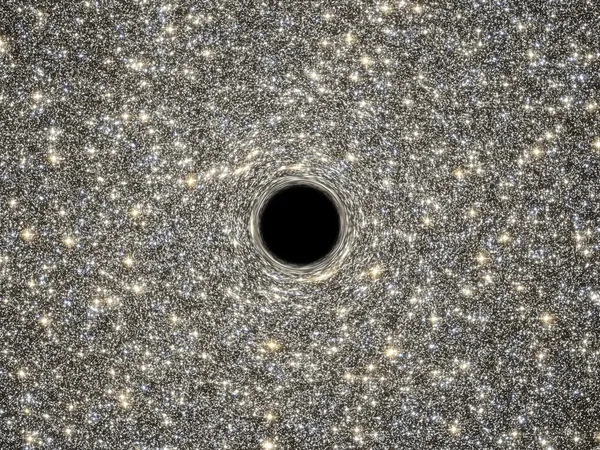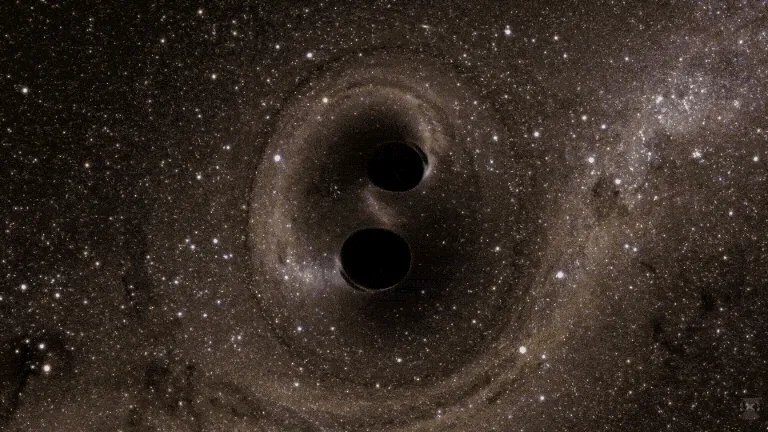
Are We Living Inside a Black Hole? The Mind-Bending Theory That Has Scientists Buzzing
2025-09-15
Author: Sophie
What If Our Universe Is Enclosed in a Black Hole?
When we look up at the night sky, it’s tempting to think that space stretches endlessly. However, cosmologists assert that the universe does indeed have its boundaries. According to their leading theories, space and time sprang from a singularity—a minuscule, incredibly dense point that exploded into what we know as the Big Bang. Surrounding the visible universe is the event horizon, a boundary from which nothing can escape, as the cosmos expanded faster than light itself, leaving portions forever out of reach.
The Striking Similarities Between Black Holes and Our Universe
These concepts—a singularity and an event horizon—are also key characteristics of black holes, those astronomical beasts that consume matter, energy, and even light. It’s intriguing to consider that, much like our universe, black holes are defined by event horizons. This resemblance has led to a provocative idea in recent scientific discourse: what if our universe is, in fact, nestled within a black hole?
Astrophysicist Niayesh Afshordi from the Perimeter Institute for Theoretical Physics believes this idea isn’t merely the whimsy of late-night theorists. "It's certainly a reasonable thought," he states. "The challenge lies in making the details work together."
A Brief History of the Black Hole Universe Theory
The mathematics that describe our universe bear striking resemblance to those that define black holes, both rooted in Albert Einstein’s theory of general relativity. This theory explains that massive objects warp the fabric of space-time, dictating their movement and the nature of gravity. Remarkably, the observable universe’s radius aligns perfectly with that of a black hole equal in mass to our cosmos.
The concept of the universe inhabiting a black hole was first explored by theoretical physicist Raj Kumar Pathria and mathematician I.J. Good in the 1970s. Two decades later, physicist Lee Smolin built on this idea, proposing that each black hole births a new universe within itself, one with potentially differing physical laws—a phenomenon he termed "cosmological natural selection."
Cosmos vs. Black Hole: A Fascinating Dichotomy
Despite its unorthodox nature, the link between black holes and the universe is acknowledged by many physicists. Ghazal Geshnizjani, a colleague of Afshordi, emphasizes, "Mathematically, they are very much related. They are essentially opposites." The universe began as a singularity that led to the Big Bang, while black holes end with singularities, tiny points crushing all that falls within them.
Black holes often get a bad rap as cosmic vacuums, but they're not always chaotic. A spacecraft can navigate a stable orbit around a black hole without issue—until it crosses that fateful event horizon, where escape is impossible. Similarly, the universe's ongoing expansion drives a phenomenon where distant galaxies move away faster than those closer to us. At certain distances, this expansion exceeds the speed of light, pushing celestial bodies beyond our cosmic horizon—almost like they’re vanishing into an insides-out black hole.
Testing the Black Hole Universe Theory
So, what would be the signs if our universe resides within a black hole? Astronomers might expect a type of orientation in the cosmos, such as galaxies twirling in a specific direction or an axis observed in the cosmic microwave background radiation—an echo of the Big Bang. Afshordi notes, "One direction might point toward the black hole's center, while another points outward."
However, observations reveal that, on large scales, the universe is surprisingly uniform, a principle that suggests no special direction exists. This constancy raises questions: how could such uniformity emerge from a black hole's chaotic formation? After all, black holes arise from the explosive death of stars, a process that's anything but orderly.
The Quest for Answers in the Cosmic Mystery
Delving deeper into these connections necessitates a merger of the two dominant theories of the 20th century: general relativity and quantum mechanics. The singularity inside a black hole is a point where both theories struggle to provide clarity, leaving scientists searching for a unified theory of quantum gravity. Unfortunately, progress in this realm has been slow.
Yet, exploring the prospect of our universe existing within a black hole could unlock groundbreaking revelations. As scientists continue to probe the depths of these monumental ideas, they might just redefine our understanding of the cosmos. Could it be that we are not only part of the universe, but also its very essence exists within a black hole?









 Brasil (PT)
Brasil (PT)
 Canada (EN)
Canada (EN)
 Chile (ES)
Chile (ES)
 Česko (CS)
Česko (CS)
 대한민국 (KO)
대한민국 (KO)
 España (ES)
España (ES)
 France (FR)
France (FR)
 Hong Kong (EN)
Hong Kong (EN)
 Italia (IT)
Italia (IT)
 日本 (JA)
日本 (JA)
 Magyarország (HU)
Magyarország (HU)
 Norge (NO)
Norge (NO)
 Polska (PL)
Polska (PL)
 Schweiz (DE)
Schweiz (DE)
 Singapore (EN)
Singapore (EN)
 Sverige (SV)
Sverige (SV)
 Suomi (FI)
Suomi (FI)
 Türkiye (TR)
Türkiye (TR)
 الإمارات العربية المتحدة (AR)
الإمارات العربية المتحدة (AR)